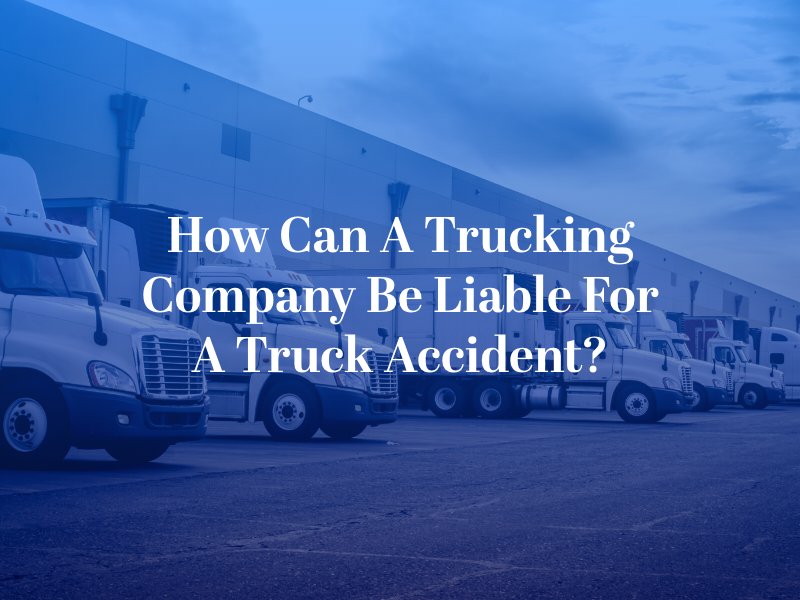Who Can Be Held Responsible for a Truck Accident in Illinois?
If you or somebody you care about has been involved in an accident with a larger commercial vehicle or commercial truck in Illinois, you need to act quickly in order to preserve evidence and increase your chances of recovering compensation. One of the main complications of these cases is determining who is responsible, but the reality is that there may be multiple liable parties. We encourage you to reach out to a truck accident attorney in Illinois who can walk you through this process.
The Truck Driver
One of the first parties investigated in a truck accident is the truck driver. Drivers are responsible for operating their trucks in a safe way, adhering to traffic laws, and following regulations set by the Federal Motor Carrier Safety Administration (FMCSA). When drivers fail to meet these standards, they may be held liable for accidents resulting from:
- Fatigue. Although federal regulations limit the number of hours a truck driver can be on the road, some drivers push past these limits, leading to fatigue-related accidents.
- Speeding or reckless driving. Truck drivers are expected to follow speed limits and exercise caution, particularly given the size and weight of their vehicles. Reckless behavior, such as tailgating or speeding, can lead to devastating accidents.
- Impaired driving. Driving while impaired by drugs or alcohol is illegal and particularly dangerous for truck drivers. Illinois has strict laws on impaired driving, and violations can lead to criminal charges and liability in a civil case.

The Trucking Company
Trucking companies are often liable for accidents involving their vehicles and drivers. Illinois law holds companies accountable for the actions of their employees, especially if they fail to provide adequate supervision, training, or safety protocols. Trucking companies may be found liable if they:
- Encourage drivers to exceed legal driving hours. Some companies place pressure on drivers to meet strict deadlines, leading them to violate federal hours-of-service regulations, which aim to reduce fatigue-related accidents.
- Neglect driver training or vetting. Trucking companies must ensure their drivers have the skills and qualifications necessary to operate large commercial vehicles. A company can be held liable if they hire unqualified drivers or fail to provide adequate training.
- Fail to maintain vehicles. Proper maintenance of trucks is essential for safe operation. When trucking companies neglect regular inspections and maintenance, they may be liable if a mechanical failure contributes to an accident.
Trucking companies often carry substantial insurance policies due to the risk associated with operating large vehicles, making them a primary target in compensation claims.
The Cargo Loading Company
In some cases, a third-party company is responsible for loading cargo onto trucks. Improper loading practices, such as overloading or failing to secure cargo, can lead to accidents due to shifting loads or increased stopping distances. Cargo loading companies may be liable if they:
- Overload the truck. Exceeding weight limits can make a truck difficult to control and increase the likelihood of tire blowouts or other mechanical failures.
- Fail to secure cargo properly. When cargo shifts during transit, it can destabilize the truck, leading to rollovers or other types of accidents.
Cargo loading companies must follow strict safety protocols, and failure to do so can make them responsible for damages caused by cargo-related incidents.
Truck and Parts Manufacturers
Trucks are complex machines made up of numerous parts, each of which needs to function correctly for safe operation. Sometimes, truck accidents result from mechanical failures, such as faulty brakes, tires, or steering systems. If an accident can be traced back to a defective part, the manufacturer may be held liable.
- Defective brakes or tires. Brake and tire failures are common causes of truck accidents. If a defect in manufacturing or design is found, the manufacturer may be held responsible for damages.
- Faulty steering or suspension. Mechanical issues with a truck’s steering or suspension can lead to loss of control. If the defect is due to a design flaw, the manufacturer of that specific part may bear liability.
Product liability laws allow victims to seek compensation directly from manufacturers when a defect in the truck or its parts contributes to an accident.
The Maintenance Provider
In some cases, trucking companies outsource their maintenance to third-party providers. These providers are responsible for keeping trucks in safe working condition by conducting regular inspections and repairs. If a maintenance provider fails to address known issues or performs substandard repairs, they may be held liable for accidents caused by mechanical failures.
For example:
- Neglecting to replace worn tires or brakes could lead to a preventable accident, especially given the significant weight and stress on truck components.
- Failing to inspect critical systems. Skipping routine checks on essential components, such as the transmission or fuel systems, can increase the risk of mechanical failure during transit.
When inadequate maintenance contributes to an accident, the provider may share liability alongside the trucking company or other involved parties.
Working With an Illinois Truck Accident Attorney
Truck accident cases are often complex, involving multiple parties and a thorough investigation into each entity’s role in the incident. Navigating these complexities can be overwhelming, especially while recovering from injuries. An experienced Illinois truck accident attorney can help you and your family. If you or a loved one has been involved in a truck accident in Illinois, consulting with an attorney can provide the support and expertise you need.
